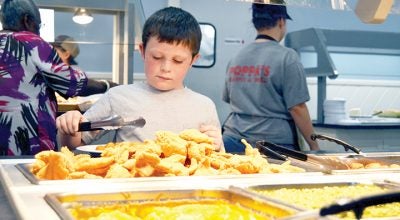City of Brookhaven moves closer to ‘Neighborhood Watch of the Future’
Published 3:26 pm Monday, March 27, 2023

- PHOTO BY BRETT CAMPBELL Sandy Turnage explains the Fusus system to the Brookhaven Board of Aldermen.
The Brookhaven Board of Aldermen have been presented with a camera access program that another Southern city dubbed the “Neighborhood Watch of the 21st Century.”
The Fusus company, based in Georgia, provides RTC3, a Real-Time Crime Center in the Cloud. The internet-based system allows law enforcement access to existing video cameras to improve response times and accuracy of investigative leads.
Andy and Sandy Turnage of Pileum — an IT services company based in Jackson that is a reseller of the Fusus system — and Fusus representative Chris Taylor presented the program to Board members who were in attendance for a special-called meeting on the proposal Tuesday.
In addition to selling the system, Andy Turnage is also a Marion County Sheriff’s Deputy. Fusus rep Taylor is a recently-retired Nashville Police Department Assistant Chief.
“Crime rates are increasing everywhere. The Real Time Crime Center at the centralized dispatch center will help combat crime in the 21st century,” Andy Turnage said. “It puts more eyes on the street. More accountability leads to solving crime faster.”
What is Fusus, and what is its benefit?
Fusus is a system that allows law enforcement to tap into existing cameras in order to access live and recorded video streams.
Cameras can only be accessed if the owner grants permission — one-time or continual — and information is utilized only by law enforcement.
“It integrates all public safety technological investments,” Sandy Turnage said. “We can access all cameras that are there for the safety of the public.”
Information can be accessed in real-time, providing vital information to officers who are looking for an individual or vehicle. Officers responding to a potentially dangerous situation can access video of the incident prior to arriving on scene, so they know what to expect and better anticipate how to respond.
If an incident occurs at a school that is linked to the system, law enforcement can tap into cameras and see what has occurred and what is going on, including the location of students, teachers, and possible threats.
A tip line is available for citizens to report emergencies, and an app is available for law enforcement use. An Artificial Intelligence program can also speed up searches, allowing authorities to search for specific times, for vehicles and individuals by certain characteristics — such as yellow shirts, backpacks, type of vehicle or color of vehicle.
The quick, user-friendly program led the City of Atlanta to call Fusus the “Neighborhood Watch of the 21st Century.”
Business and property owners can allow access to their cameras, or simply register them, allowing Fusus to know a camera exists in a particular location, if law enforcement needs to request temporary access to its footage.
“Brookhaven Fire Department spent about 12 hours trying to find where cameras were located,” BPD Assistant Chief Clint Earls said, referring to the first day of investigation following February’s fire at a Brookhaven Housing Authority apartment complex. “How long did it take to look at all the footage?” he asked Fire Chief Jeff Ainsworth.
“We’re still looking at video,” Ainsworth said.
If Fusus had already been integrated, Earls said, authorities would have known within a few minutes at most where all the cameras were in the area and have accessed or requested access to video streams. The AI program would have allowed pinpointing an exact time and location to narrow investigation, Earls said.
Police officers can also request access to video without making a physical visit to a residence, Police Chief Kenneth Collins said. This would free up officers and also help with a person who may be nervous about someone else seeing a police presence at their home, he said.
The immediate access to cameras would make a vital difference if a tragedy were to occur at a local school, Taylor said.
“We don’t ever want to have active shooters, but we want to be prepared for it if it happens,” he said. “If a teacher hits the SOS button on the phone app, it pops up immediately on a map and pulls up access to the four closest cameras.”
While metal roofs may not allow the GPS to be exact to the spot for the alerting phone, Taylor said, it will at least get responding officers to the right building and room.
“We’re talking seconds, and that makes a big difference,” he said. “The panic button can also call 911. If you have a need to push the panic button, you should also call 911, but if you cannot call, the button will give you the option of notifying 911 by holding it for a few seconds.”
“This can pinpoint a location on a floor plan of the school or other building,” Andy Turnage said. “That’s better than guessing. Time is of the essence.”
“This helps protect the businesses, and curtails a lot of crime to do this,” said Alderman Fletcher Grice.
What is the cost, and who pays?
“It’s very cost effective,” Sandy Turnage said.
There is no activation fee for the service, and minimal hardware. Cores — small Fusus internet access boxes — begin at $200 each, and price increases as storage capability increases.
The Basic plan is $75,000 per year and provides access to up to 150 video streams. The Pro plan is $150,000 annually and can access up to 500 streams.
Both plans provide the maps, floor plans, doorbell camera access (except Ring brand), tip line, storage vaults, access to license plate readers and tech support.
Grants are available to help cover the cost, from Homeland Security and the Department of Justice.
The City of Brookhaven has more than 60 cameras currently. Cameras that are opted into the system also each count as individual streams, from businesses, personal properties, schools, medical facilities, etc.
The City would need at minimum the Basic plan plus AI access for an additional $5,000, according to Turnage.
What is the city’s plan?
Taylor and the Turnage brothers will submit a formal proposal to the City for its consideration. The Board of Aldermen will then review it and — after making any necessary changes or adjustments — vote whether to approve it.
“It’s an investment in the future of our town,” Chief Collins said. “It’s for the safety of our children. If we’re going to open this town up to more activities, let’s get it safe first. It’s going to take all of us working together.”




